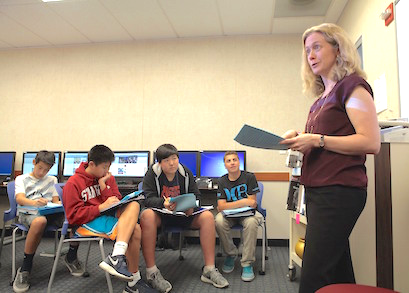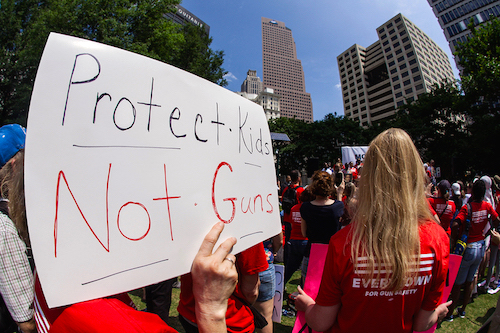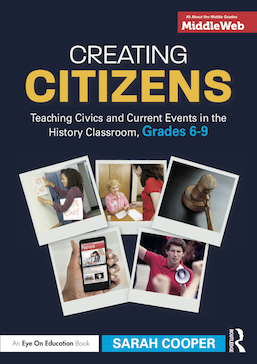When Staying Nonpartisan Feels Just Too Difficult
Regardless of where teachers land politically, and whether or not you hope to remain an impartial guide, it can sometimes feel like tiptoeing through a minefield to facilitate a balanced discussion of current events, with all the sharp edges and visceral responses that come along with reading the news.
But, as students have reflected back to me so many times, no matter how divided we may feel about an issue, it’s important to be able to talk it out in a civilized way. A benefit of doing this in our middle school classrooms is that, ideally, we are modeling this kind of thoughtful discourse for the journalists, governors, scientists, teachers, and parents of tomorrow—the young adolescents sitting right in front of us.
Putting ourselves in the heads of others
So many times in the past couple of years, I’ve read the news and wondered: How in the world am I going to stay unbiased when I present this to my students? Sometimes I decide simply not to present or to focus on that story. At other times, however, the topic is impossible to avoid because it is the top news story that day and students will have questions about it.
At times when I feel this strongly about a subject, I will rely on strategies to help tackle the news logically, such as distancing myself through meaningful analysis from an initial gut-check response and playing the devil’s advocate in response to student comments. Both approaches require me and the students to put ourselves in the heads of people with different views and opinions, thus expanding our worldview and balancing us.
Stepping gingerly into the fray
But there are moments when do I step gingerly and carefully into the fray of politics, usually relating to historical parallels that students need to know about. As a social studies teacher, it seems to me that we have an obligation to point out times when the government could be overstepping its bounds—on either side of the political spectrum. As a result, categories of current events in which I will occasionally give an opinion are:
1. Infringements upon free speech, during wartime or otherwise, which I am apt to compare with historical events such as the Alien and Sedition Acts of John Adams’ presidency, the Espionage and Seditions Acts at the end of World War I, and many Supreme Court cases after that, such as Schenck v. United States (1919) or Whitney v. California (1927).
2. Interruption of Constitutional expectations or due process, which I’ll often connect to the abridgement of rights in wartime, from Lincoln’s suspension of habeas corpus at the beginning of the Civil War to Franklin Delano Roosevelt’s imposition of Executive Order 9066 in World War II.
3. Federal-state conflicts in which the supremacy clause of the national government seems to be pushing a little too far toward taking away the rights of a state to be a “laboratory” for democracy, as Justice Louis Brandeis wrote in a 1930s Supreme Court case:
“To stay experimentation in things social and economic is a grave responsibility. Denial of the right to experiment may be fraught with serious consequences to the nation. It is one of the happy incidents of the federal system that a single courageous State may, if its citizens choose, serve as a laboratory; and try novel social and economic experiments without risk to the rest of the country.” (New State Ice Co. v. Liebmann, 1932)
4. Controversial actions that appear to violate our school’s honor code, which focuses on kindness, generosity, honesty and respect.
“Who I Am” issues
In addition, there are a few issues that, because of who I am, remain almost impossible to stay nonpartisan about. There might be some for you, too.
First, I believe strongly in many causes that the women’s movement has fought for over time, and I call myself a feminist with my students—while explaining that “feminist” is a fraught term for many women and men today. A colleague who holds similar views said that she will sometimes poke fun at the particularly extreme views of some radical feminists simply to show her students that she holds a sense of moderation and humor about the issues.
Second, I am Jewish, and, while the Jewish community contains myriad views on national politics and Israel, there are some topics I feel I need to raise my voice for. Any instance of Holocaust denial is an obvious one. But some are less obvious, and I will always remember an issue on which I expressed my opinion, thinking it was essentially uncontroversial, and only later found out I had offended an eighth-grade student.
To give context: In class I often feel that I talk a lot about reform and change in American history without necessarily doing anything about it—except teaching, which I think can be a revolutionary act in itself on some days!
So, when a local issue came up that frustrated me so much I planned to attend a town meeting about it, I relished telling my classes about my civic activism.
A local issue that impacted one student
The issue was small on the surface: a sign established in a local park that recalled the park’s original name given in the 1930s, that of a German government official in the time of Hitler. A private group’s stated intent in paying for the sign was to acknowledge the history of German gatherings in the park in the 1930s, both political and social, Bund meetings and Oktoberfests alike. I and many others saw the large sign as offensive and unnecessary.
After telling my students about this, however, the next day a kind and thoughtful girl asked if she could talk with me after class. Near tears, she explained that she had been teased for her German heritage in class in elementary school when discussing World War II, and my bringing up this issue had struck close to the bone. I felt terrible that I had contributed to any sadness on her part, and we talked through the issues of then versus now, of how she relates to the Germany of almost a century ago.
Our relationship survived and even deepened after this event, and her mother later told me that this was an important moment for her daughter, but I still carry the memory of this conversation as a caveat.
Our students are listening
Which brings me to my final thought about creating balance in the classroom: You can never know everything about your students, and you never know which parts of these middle schoolers’ ever-evolving brains are listening to what you say. All the more reason to speak with thoughtfulness, balance and openness as much as we can, as often as we can.
_________________________
Sarah Cooper teaches eighth-grade US history and is the Dean of Studies at Flintridge Preparatory School in La Cañada, California, where she has also taught English Language Arts. Sarah is the author of the new Routledge/MiddleWeb book Creating Citizens: Teaching Civics and Current Events in the History Classroom, Grades 6–9, from which this article is adapted.
Sarah is also the author of Making History Mine (Stenhouse, 2009). She presents at conferences and writes for MiddleWeb’s Future of History blog, as well as for Edutopia, CommonLit, and other education sites.







































I remember in the spring of 2016, a student brought up white privilege, and after a short discussion the conversation turned to the more general student-asked question, “How does race affect your life?” Towards the end of the conversation, a kid turned me and asked me to ask to answer the question. They had been honest, vulnerable, open to and supportive of each other. Also, a presidential campaign was going on in which one candidate in particular was unabashedly racist (sexist, etc.). I felt I not to answer the question would be to betray them. And so I answered.
I find anchoring these moments in respect can go a long way. Respect for different opinions. Respect for our common humanity. And I think when those two respects are placed in opposition, respect for our common humanity has to be the priority. I’ll tell kids on occasion, usually when they bring up this very issue, “Your feelings are what they are, and I’ll never argue with them. And you have every right to your own opinion. But if that opinion cannot be stated without disrespecting members of our school community including kids in this room, then perhaps it’s best you keep it to yourself. You can still feel free, however, to talk it through privately with me.”
Bill, this is a beautiful testimony to the culture of respect you build in your classroom. Thank you for sharing it with all of us. I have to admit I’m curious as to what you responded!
Thanks, Sarah, for your kind words. My response went something like, “I do believe in white privilege, because I see that there are things I don’t have to deal with because I’m white. I also believe that our country suffers from institutionalized racism, that there are statistics to back that up, and that I have a duty to fight it. Being human, I sometimes mess up in my anti-racist work, but I don’t use that as an excuse to give up. I try to make it learning moment and do better the next time.” I think I might have connected it to feminism somehow as well (the kids are well aware I’m a feminist, or more precisely a gender activist), trying to set things up for an activity on intersectionality the next day.
Love this! Thanks for sharing your words, Bill.
My students will often ask me about my opinions on things, which is why I usually turn their queries around and ask them what they think, but not with present mindedness necessarily, but with empathy for the past. One of the history habits of mind! They accept that I don’t want to try and influence their thinking (gifted 6th graders) and they can speak about the issues with their families. Thanks for your approaches. As a former practicing lawyer for many years, I also present situations to them, real or imagined to ponder and offer their opinions, based upon our study of the Bill of Rights.
Gary, your idea of case studies is a wonderful one. And how do you ask questions encouraging students’ empathy for the past? I would love to imagine an example.
Like you, I also like bringing in situations that relate to constitutional issues. Recently my students were fascinated and mystified by the current Masterpiece Cakeshop v. Colorado Civil Right Commission case before the Supreme Court this term. Some saw the freedom of expression argument so clearly, others gravitated toward the anti-discrimination argument, and still others insisted it was just a cake. I did not give my opinion on this one!
Sarah, this is one of your best articles yet! I love your personal examples and your tying things into the culture your school aims to build: “Controversial actions that appear to violate our school’s honor code, which focuses on kindness, generosity, honesty and respect.” I need to buy your book!
Thank you, Mary! And our honor code is a real touchstone for us as teachers.
Thank, Sarah. This past year has been a struggle. I like your approach of relating current events to past examples in history. I always feel a little safer in history than in current events!
Lauren, your point about history feeling “safer” is true for me, too. Thanks for your thoughtful comment.